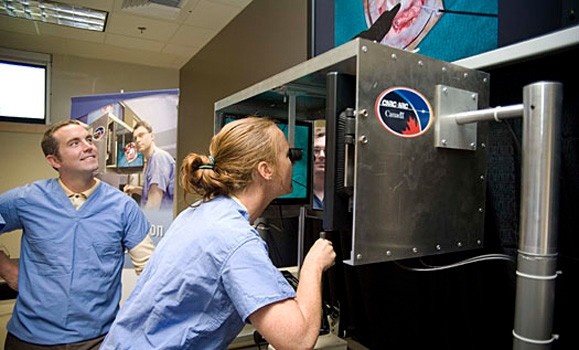Neurosurgery has been learned on the job for more than 100 years, but that’s about to change: it’s now possible to learn, practise and rehearse neurosurgical skills and neurosurgery without patients, using a one-of-a-kind simulator.
A group of national and international brain surgeons, researchers, educators, and engineers are gathered in Halifax this weekend map out how to integrate the use of a simulator (simulation) into neurosurgical training – to establish a training program that will change the way brain surgery is taught and learned in Canada and around the world.
“The integration of simulation into neurosurgical training is pressing – and exciting – because it heeds universal calls for greater patient safety and responds to the need for better and more efficient use of healthcare resources,” says Dr. David Clarke, professor of neurosurgery at Dalhousie Medical School, staff neurosurgeon at Capital Health, and member of the Brain Repair Centre.
“Using a simulator as a training tool will lessen the need to practise skills on patients, will enable trainees and surgeons to rehearse surgeries, and will reduce the amount of time trainees spend in the OR, increasing greater efficiency,” he explains.
Dr. Clarke is a collaborator on the National Research Council (NRC) project to develop the neurosurgical simulator, which was unveiled in 2009 when he first used it at the QEII Health Sciences Centre to map out and perform a surgical plan in virtual reality prior to an actual surgery to remove a brain tumour. The simulator is not yet available anywhere else in the world.
At the time of its first use, Dr. Clarke said, “This simulator will become a key component of neurosurgical training and will help to optimize patient outcomes and recovery.” The two-day meeting held on October 14 and 15, an initiative of the Brain Repair Centre, was a huge step toward making this happen.
“The neurosurgical simulation work to date in Halifax and its implications are attracting attention across the globe. A group of Israeli delegates, who first expressed interest in the simulator at a Canada/Israel Summit, is among the meeting’s international attendees,” says Dr. Ryan D’Arcy of the National Research Council and Brain Repair Centre. “The potential to shape the future of brain surgery here and around the world by developing an advanced neurosurgical training program is tremendous."
The Halifax-based neurosurgical simulation curriculum work and the October 14 and 15 meeting are collaborative efforts supported by the Brain Repair Centre, Dalhousie Medical School and Capital Health.

